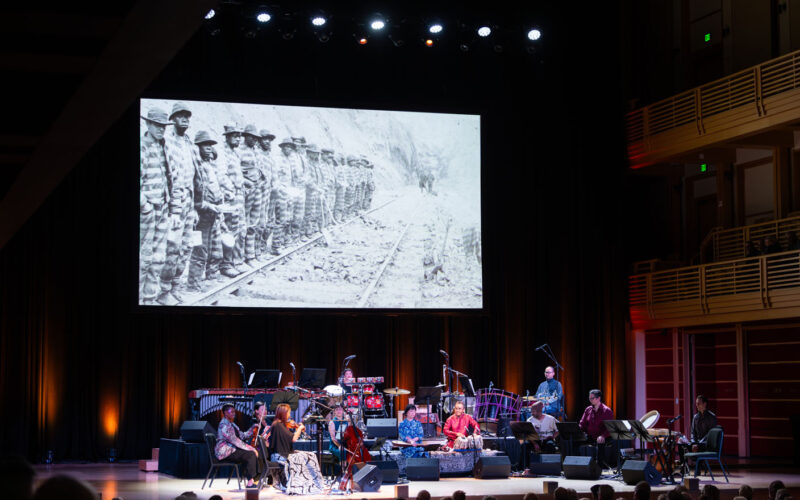Silkroad Ensemble explores untold history of workers in American Railroad Nov. 12 in Rogers

MONICA HOOPER
mhooper@nwaonline.com
Silkroad Ensemble’s Rhiannon Giddens didn’t intend to release her haunting arrangement of the early 19th century work song, “Swannanoa Tunnel/Steel Driving Man,” just days after Hurricane Helene ripped through the same region mentioned in the song.
She acknowledged the eerie coincidence in an interview with NPR.
“It was a grieving song for these men who lost their lives, and it’s now a grieving song for a whole ‘nother calamity,” the Artistic Director of Silkroad Ensemble said before breaking down over the devastation in her native North Carolina.
The song mourns those who died swinging a hammer for the railroad. With a slight drawl, Giddens sings in time with a steady thump created by percussionists Shane Shanahan and Kaoru Watanabe:
“When you hear that (thump)/hoot owl squalling (thump)/somebody died, babe (thump)/ Somebody died (thump).”
Images of the African American prisoners who built that section of railroad are projected above the ensemble as they play. The men were often imprisoned under false or exaggerated charges after the abolition of slavery.
“You can see the sweat on these people’s faces and how dirty their clothes are from working all day. You get a sense of how hard the work was,” Watanabe said during an interview last month with What’s Up.
An estimated 125-300 workers died and were buried in unmarked graves along the railroad during the construction that tunneled through the Blue Ridge Mountains. Many died in cave-ins and accidental explosions or from disease. Some were shot by prison guards.
“Swannanoa Tunnel” is the first single from Silkroad Ensemble’s forthcoming album, “American Railroad,” and one of the many songs and stories performed by the cross-cultural ensemble for their national tour of the same name. The initiative is a “musical journey of reclamation” that tells the stories of those who built the Transcontinental Railroad including Native Americans and African Americans as well as Irish, Chinese, Japanese and other immigrant laborers.
Silkroad Ensemble brings the program to Rogers Convention Center at 6:30 p.m. Nov. 12.
“If you would’ve asked me what I knew about the American railroad before I did this project, I would have a pretty general and vague idea of both the benefits and also the destructive elements,” Watanabe said.
In addition to playing Japanese Flutes and percussion for the ensemble, he was among the many Silkroad artists who visited museums, railroad sites and historical societies all over the U.S. to research the people and songs.
“I was able to better imagine what the different groups of people went through and even started to think of the individuals and what their lives might have been like hundreds of years ago in America, the hardships and the struggles as well as the joy that they were able to experience,” he said. “It just personalized the history for me, and I think that hopefully feeds into the art and the music that we created.”
Watanabe even visited the Shiloh Museum of Ozark History in Springdale during his research. In April, he performed in Silkroad’s Train Station Trio with Sandeep Das and Niwel Tsumbu at Faulkner Center in Fayetteville.
In addition to new arrangements by world-class composers, the program also includes world premiere works by Layale Chaker and Das, Pulitzer Prize-winning composer Michael Abels, as well as new arrangements by Balla Kouyaté with Mike Block, Pura Fé and Shane Shanahan.
“We all come from different places, but we’re able to get on stage and create this incredible harmony,” Watanabe said.
Just two days after the Rogers concert, Silkroad will release a limited series podcast hosted by Giddens to illuminate the stories shared in the American Railroad program. The album comes out Nov. 15. Find out more at silkroad.org/american-railroad.
—
FAQ
Silkroad Ensemble with Rhiannon Giddens American Railroad Tour
WHAT — A musical journey of reclamation focused on the people who built the Transcontinental Railroad including Native Americans, African Americans, Irish, Chinese, Japanese and other immigrant laborers. The program includes arrangements by Layale Chaker and Sandeep Das and composer Michael Abels, as well as new arrangements by Balla Kouyaté with Mike Block, Pura Fé, and Shane Shanahan and by guest artist Yazhi Guo.
WHEN — 6:30 p.m. Nov. 12
WHERE — Rogers Convention Center
TICKETS — $35-$75
INFO — silkroad.org/american-railroad


